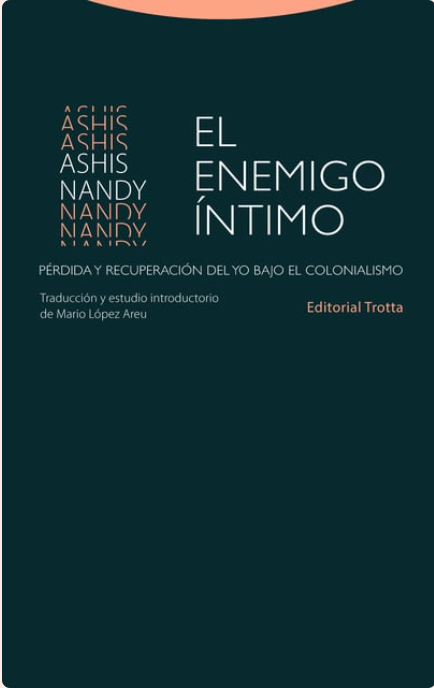Abstract
Ashis Nandy and his work are generally unknown for those not familiarized with India. His essay, The Intimate Enemy, encourages readers to reflect on certain values that, even though they most probably considered universal, are a consequence of local constructions, derived from particular experiences. Thus, the Intimate Enemy reevaluates hierarchical power relations determined by colonialism and, particularly, British imperialism during the 19th and 20th centuries. The long-lasting impact of these practices on collective ideology represent a central concern in this piece of writing, which analyzes its repercussions not only over the colonized subjects, but also on the colonizer. This review strives to simplify the most relevant contents and arguments within this book in order to make them more comprehensible for the reader.
References
Acharya, Amitav & Plesch, Dan. ¨The United Nations¨, in Managing and Reshaping a Changing World Order. Global Governance: A Review of Multilateralism and International Organizations. Special Issue: The United Nations at 75. Volume 26: Issue 2. Brill: Jun 2020. Pp. 221–235. https://brill.com/view/journals/gg/26/2/article-p221_3.xml
Bonnett, A. (2012). ¨The Critical Traditionalism of Ashis Nandy¨. Theory, Culture & Society, 29(1), (2012) 138–157. doi:10.1177/0263276411417462. https://journals.sagepub.com/doi/abs/10.1177/0263276411417462
Booth, K. ¨Theory of world security¨ (vol. 105). Cambridge University Press: 2007
Caballero, S. “Los estudios críticos en las Relaciones Internacionales en España. Comillas Journal of International Relations, nº 16 (2019). ISSN 2386-5776. DOI: 10.14422/cir.i16.y2019.005. https://revistas.comillas.edu/index.php/internationalrelations/article/view/11962
Chakrabarty, Dipesh. Al margen de Europa. ¿Estamos ante el final del predominio cultural europeo?. Ensayo Tusquets, 2008.
Guha, Rajanit. Dominance without Hegemony. History and Power in Colonial India. Harvard University Press, 1998
Kang, D. C. ¨Getting Asia Wrong: The Need for New Analytical Frameworks¨. International Security, 27(4), (2003): 57–85. http://www.jstor.org/stable/4137604.
López Areu, M. “La teoría política ante el desafío de un mundo multipolar”. Revista de estudios políticos 188: 2020. Pp. 13-40. ISSN 0048-7694. Universidad Pontificia Comillas. https://repositorio.comillas.edu/xmlui/handle/11531/46462
Nandy, Ashis. “The Making and Unmaking of Political Cultures in India”. Daedalus, Vol. 102, No. 1, Post-Traditional Societies. MIT: 1973. Pp. 115-137. https://www.jstor.org/stable/20024112
Sri Shankaracharya. Atma Bodha, translated by Swami Nikhilananda. Sri Ramakrishna Math, Madras: 1947.
Thapar, Romila. 17th J.P.Naik Memorial Lecture on Selecting Identities from the Past, 2005 https://www.cwds.ac.in/wp-content/uploads/2016/09/Selecting-indentities.pdf
Thoits, en Echebarría Echabe y José F. Valencia Gárate, 1993. ¨Identidad de Género, ética protestante y atribución de causalidad¨, Aprendizaje, Revista de Psicología social, 8 (2), 1989. Pp. 235-247. ISSN 0213-47489. https://dialnet.unirioja.es/descarga/articulo/111790.pdf
Waltz, Kenneth N. Theory of International Politics. Mcgraw-Hill: 1979
Zimmer, Heinrich. Mitos y símbolos de la India. Siruela: 1995

